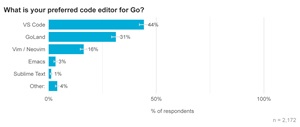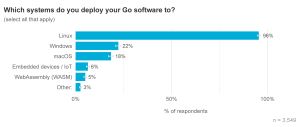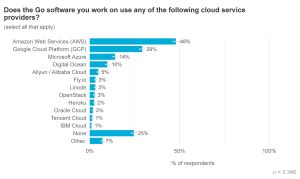News
VS Code Used to Survey Go Devs, Who Name VS Code No. 1 Editor
As we have reported before, Microsoft's super-popular Visual Studio Code is the No. 1 code editor for multiple programming languages, and Google's Go is on that list.
The Go Project team last week published Go Developer Survey 2023 H2 Results wherein respondents named VS Code as their No. 1 editor.
The Go team might have anticipated this finding as it used VS Code itself to field the survey along with its own blog. Recognizing that offering up the survey in VS Code might skew results related to editors, the team took steps to account for bias. Even so, VS Code still emerged at the top, even beating out the bespoke GoLand editor.
"The most common code editors among Go Developer Survey respondents continue to be VS Code (44 percent) and GoLand (31 percent). Both of these proportions ticked down slightly from 2023 H1 (46 percent and 33 percent, respectively), but remain within this survey's margin of error."
 [Click on image for larger view.] No. 1 Editor for Go Devs (source: Go Team at Google).
[Click on image for larger view.] No. 1 Editor for Go Devs (source: Go Team at Google).
As we reported, those results are similar to surveys conducted for Rust and Python developers.
And, just as it has with Rust and Python (and Java) Microsoft has embraced the Go language despite the company offering up its own C#, TypeScript and so on. For Go, Microsoft even worked with arch cloud rival Google, which in 2020 took over from Microsoft the development of the Go extension for VS Code. As we reported, Microsoft's embrace started years ago, especially for its Azure cloud.
Go is a natural fit for the cloud, and the cloud usually means Linux, so it's no surprise Linux was named the top OS used by respondents. The cross-platform VS Code, of course, is right at home on Linux.
 [Click on image for larger view.] Linux Is Top OS (source: Go Team at Google).
[Click on image for larger view.] Linux Is Top OS (source: Go Team at Google).
As far as preferred cloud platforms, however, Microsoft comes in third place among the cloud giants, with AWS perhaps surprisingly beating out Google Cloud.
 [Click on image for larger view.] Cloud Providers (source: Go Team at Google).
[Click on image for larger view.] Cloud Providers (source: Go Team at Google).
The survey is huge, so to summarize the rest of its findings, we'll rely on the Go team's own tl;dr:
- Go developers said they are more interested in AI/ML tooling that improves the quality, reliability, and performance of code they write, rather than writing code for them. An always-awake, never-busy expert "reviewer" might be one of the more helpful forms of AI developer assistance.
- The top requests for improving toolchain warnings and errors were to make the messages more comprehensible and actionable; this sentiment was shared by developers of all experience levels, but was particularly strong among newer Go developers.
- Our experiment with project templates (gonew) appears to solve critical problems for Go developers (especially developers new to Go) and does so in a way that matches their existing workflows for starting a new project. Based on these findings, we believe gonew can substantially reduce onboarding barriers for new Go developers and ease adoption of Go in organizations.
- Three out of every four respondents work on Go software that also uses cloud services; this is evidence that developers see Go as a language for modern, cloud-based development.
- Developer sentiment towards Go remains extremely positive, with 90 percent of survey respondents saying they felt satisfied while working with Go during the prior year.
The biannual survey of Go developers was undertaken in August 2023, garnering 4,005 responses from outreach via the team's blog and a randomized prompt in VS Code.
About the Author
David Ramel is an editor and writer at Converge 360.